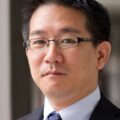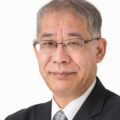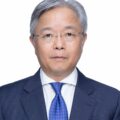Interview: Foreign Minister KONO Taro Japan’s Diplomatic Landscape in 2018 Pushing North Korea toward Denuclearization by Applying Continued Pressure
―― Since you became Foreign Minister, your highly motivated strategic communications in Japan and abroad, as well as your active visits to foreign countries, have attracted attention.

Foreign Minister, Kono Taro
Kono Taro: Since assuming office in August 2017, I have visited numerous locations around the world, taking 13 foreign trips and visiting 25 countries (30 countries if revisits are included), as well as going to Hiroshima, Nagasaki and Okinawa in Japan. I have held more than 70 Foreign Ministers’ meetings in Japan and abroad, and have held more than 160 meetings in total, including other multilateral meetings, etc.
In the process of meeting with the Foreign Ministers of other countries, I have strongly recognized that building personal relationships is very important in diplomacy. I will continue to make efforts to achieve concrete diplomatic results by solidifying personal relationships of trust and networks.
―― What kinds of diplomatic activities do you want to promote?
Kono: With the international order entering a major transformation period, Japan should not be a “follower” in the world. I think that Japan should become a beacon for the world in order to bring peace and prosperity by rapidly responding to the intense fluctuations of the global tide.
Specifically, I would like to strengthen our efforts in six priority areas.
First, Japan will further strengthen the Japan-US Alliance and promote the networking of our allies and friendly nations amid the increasingly severe security environment surrounding Japan, including the North Korean issues and recent developments in the East China Sea and the South China Sea. Second, we will enhance our cooperative relationships with neighboring countries such as China, South Korea and Russia. Third, we will promote economic diplomacy as a standard-bearer of free trade, amid the rise of protectionism mainly in Europe and the United States. Fourth, we will make contributions to the resolution of global issues such as disarmament, non-proliferation, climate change, development and women’s empowerment. And fifth, we will enhance our contribution to peace and stability in the Middle East. Sixth, we will promote the “Free and Open Indo-Pacific Strategy”.
We have begun seeing the effects of the pressure on North Korea
―― For Japan, the largest security concern is North Korea. How do you view the threats from North Korea?
Kono: North Korea has conducted three nuclear tests and launched as many as 40 ballistic missiles in the past two years. There is a possibility that they have achieved the downsizing of nuclear weapons and developed warheads, and they appear to be pursuing improvements in the technical reliability of ballistic missiles and the development of new missiles. The ballistic missile launched on November 29, 2017 is believed to be a new ICBM-class ballistic missile, given that it reached an altitude far above 4,000 kilometers and flew about 1,000 kilometers, that it was loaded on a transporter-erector-launcher (TEL) with nine axes that had not previously been seen, and that the shape of its tip was round. The fact that North Korea is repeating such a reckless outrage is absolutely unacceptable.
The launch of a missile in November 2017 has also made it clear that North Korea is consistently pursuing the development of nuclear weapons and missiles. At the UN Security Council Ministerial Meeting on non-proliferation (North Korea) on December 15, 2017, at which I took the chair, North Korea did not show any intention whatsoever of abandoning the development of nuclear weapons in accordance with the Security Council resolutions, justifying their development as a self-defense measure. North Korea’s development of nuclear weapons and missiles has become an unprecedented, grave and imminent threat for the international community, including Japan, Japan will not surrender to any provocative actions by North Korea.
Through the bilateral corporation between Japan and the United States, the trilateral corporation among Japan, the United States, and the Republic of Korea, and the close coordination among relevant countries including China and Russia, we are making all-out efforts to solve the issues of North Korea’s nuclear weapons and missiles, and most importantly, abductions issue by increasing the pressure on North Korea from the entire international community through the full implementation of relevant UN Security Council resolutions, including recent ones adopted in December 2017.
―― The international community has been maintaining a dialogue with North Korea. How do you evaluate it?
Kono: The international community has been choosing the path of resolving the situation through dialogue whenever North Korea created a crisis such as the Agreed Framework between the United States of America and the Democratic People’s Republic of Korea in 1994 and the joint statement of the Six-Party Talks in 2005. However, we know that North Korea has been developing nuclear weapons and missiles, using these enduring efforts for dialogue as an excuse for stalling for time, without any intention of giving up the development of nuclear weapons and missiles. North Korea, which was a long way from the technological maturity of nuclear weapons and ballistic missiles in 1994, has unfortunately now advanced these technologies.
Precisely because of these facts, the Japanese government thinks that a dialogue with North Korea for the sake of dialogue is meaningless, and that it is necessary to create a situation where North Korea will be the first to call for talks by maximizing pressure by all means to change the policy of North Korea.
As I mentioned a while ago, at the UN Security Council Ministerial Meeting on December 15, 2017, the members strongly condemned the development of nuclear weapons and ballistic missiles by North Korea and were able to deliver the strong message about the importance of the full implementation of the Security Council resolutions. In maximizing the pressure by the international community in this way, Japan is playing an active role.
―― Is the pressure having an effect?
Kono: The sanctions that the international community has been imposing on North Korea are certainly having an effect if we consider the bleak economic circumstances in North Korea.
With respect to UN Security Council Resolution 2397, which was unanimously adopted in December 2017, the supply of refined petroleum products is expected to be reduced by about 89% from the summer of 2017. In addition, as a result of increase in the number of items subject to the ban on imports from North Korea, its revenue is expected to decline by more than 200 million dollars a year, Furthermore, North Korea’s foreign currency earnings (2.7 billion US dollars) from its exports is expected to be practically eliminated, combined with the decline in earnings due to the import ban through the related UN Security Council resolutions in the past.
Moreover, China accounts for about 90% of North Korea’s foreign trade, and some statistics imply that the total trade of North Korea from January through November 2017 declined by about 11% from the same period of the previous year, while the imports decreased by about 32%.
―― China’s cooperation is indispensable for dealing with the North Korean issues.
Kono: That’s true. The role of China, which is a permanent member of the Security Council and a member country of the Six-Party Talks and accounts for about 90% of trade with North Korea, is extremely important. I myself repeatedly confirmed China’s cooperation in the full implementation of the Security Council resolutions with Foreign Minister Wang Yi.
In addition, at the UN Security Council Ministerial Meeting on December 15, 2017, countries such as Japan, the United States, Republic of Korea, the United Kingdom and France were able to deliver a unified message that strengthening the pressure would be important. In addition, at the Foreign Minister’s Meeting on Security and Stability on the Korean Peninsula hosted by Canada and the United States on January 16, we delivered the message that the international community would be united to maximize the pressure on North Korea.
Japan will seriously consider its future responses from the view point of what would be the most effective way to strengthen the pressure on North Korea for the comprehensive resolution of the outstanding issues of concern, while working closely with the countries concerned, including the United States.
―― There is a possibility that a military option will be exercised by the United States, depending on the circumstances.
Kono: What I want to point out first is the fact that it is North Korea that is taking provocative actions, and that nobody in the world wants conflict.
On that basis, Japan consistently supports the approach of President Trump: “all options are on the table.” I will not be able to go into the details, but we took sufficient time to analyze the latest situation in North Korea and agreed completely on future measures on occasions such as the Japan-US Security Consultative Committee (Japan-US “2+2”) and President Trump’s visit to Japan.
A strong deterrence based on the Japan-US Alliance is necessary for defending Japan and for securing regional peace and security. The Japan-US Alliance has become as solid as ever thanks to the development of the Legislation for Peace and Security. Cooperation between the Japanese Self-Defense Forces and the US military has become even closer at all levels through various Japan-US joint exercises, etc., and the deterrence of the Japan-US Alliance has improved significantly. The government of Japan will continue to maintain the intensely alert monitoring posture with a high sense of tension under the strong Japan-US Alliance in order to be able to respond to any situation.
―― What situation do you mean in saying the “resolution” of the issues of North Korea?
Kono: In the joint statement of the Six-Party Talks in 2005, we reconfirmed the goal of verifiable denuclearization of the Korean Peninsula and made North Korea promise to abandon all nuclear weapons and existing nuclear programs. The relevant UN Security Council resolutions that were subsequently adopted have also decided repeatedly that North Korea should abandon all nuclear weapons and existing nuclear programs. As just described, the goal of denuclearization of the Korean Peninsula is the goal confirmed by not only the members of the Six-Party Talks, but the international community as well.
In addition, the abductions issue is the most important issue for the Abe Cabinet, and our mission will not end until all the families of abductees have embraced their close relatives with their own arms.
In North Korea, there is an industrious labor force and abundant natural resources. If North Korea chooses the right path, it will be able to enrich its people. However, without resolving the issues of abductions, nuclear weapons and missiles, they will not be able to see a bright future. Japan will make North Korea change its policies by maximizing the pressure on it, through the bilateral corporation between Japan and the United States, the trilateral coordination among Japan, the United States and the Republic of Korea, and united efforts by international community.
Japan-China relations are improving progressively
―― While strained relations have continued between Japan and China since the launch of the second Abe administration, as shown by the absence of a summit meeting for a long time, they appear to have been improving recently. Minister, what is your view on the current situation of Japan-China relations?
Kono: In November 2017, Prime Minister Abe held top-level meetings with Chinese President Xi Jinping and Premier Li Keqiang in succession, taking the opportunity of the APEC Economic Leaders’ Meeting and the ASEAN-related summit meetings. These series of talks became a new start for an overall improvement in relations, with positive views being exchanged at the meetings about the mutual visits of the two countries’ leaders, the promotion of people-to-people exchanges and the strengthening of economic cooperation.
This year marks the 40th anniversary of the conclusion of the Treaty of Peace and Friendship Between Japan and the People’s Republic of China. We regard it as a good opportunity for the two countries to ensure an improvement in bilateral relations.
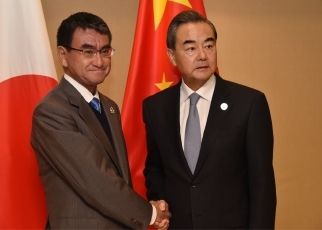
First meeting with Foreign Minister Wang Yi in Manila, which Foreign Minister Kono visited in August 2017 to attend the ASEAN-related summit meetings. A further improvement in Japan-China relations is expected.
Kono: It is also a milestone year, marking the 40th anniversary of the decision on the reform and liberalization policy by China. I think that 40 years after China shifted to the route of reform and liberalization was the time when China developed, and wide-ranging cooperation made progress between Japan and China at the same time. In terms of China’s efforts regarding reforms and liberalization, Japan has been engaging in support and cooperation involving both the public and private sectors, including the provision of official development assistance (ODA) from the standpoint of mutual cooperation, in which the smooth development of China will also be positive for the development of Japan.―― This year marks the 40th anniversary of the conclusion of the Treaty of Peace and Friendship Between Japan and the People’s Republic of China.
China has now become the world’s second-largest economic power, and both Japan and China share a major responsibility for the peace, stability and prosperity of the international community. Under these circumstances, we need to stably develop friendly and cooperative relations between the two countries from a broader perspective under the concept of a “Mutually Beneficial Relationship Based on Common Strategic Interests”, taking the 40th anniversary of the conclusion of the Treaty of Peace and Friendship Between Japan and the People’s Republic of China as a good opportunity for improving the relations. I want to open the way to Japan-China relations in the new era, in which the two countries will contribute together to addressing global challenges such as climate change and countermeasures against infectious diseases, with the two countries walking side by side.
―― What is the background for the progress made in terms of improving the bilateral relations?
Kono: Japan and China are neighboring countries that are inseparably tied and are unable to budge, with a close economic relationship and people-to-people and cultural exchanges. For example, the amount of trade between Japan and China at the time of the normalization was only about 1.1 billion dollars, but it has now increased nearly 300 times, to 301.6 billion dollars (2016), and China has become Japan’s largest trade partner. I also want to point out that the two countries share the view of working together toward the common goal of denuclearization on the Korean Peninsula in the circumstances where the nuclear and missile issues of North Korea have become an unprecedentedly serious and imminent threat.
While there are difficult issues between Japan and China, just because we are neighboring countries, we need to deepen our relations of mutual trust all the more by holding dialogues between the leaders and foreign ministers. The door for conversations has been always open for us, and I am glad that high-level talks have been carried out frequently between Japan and China lately. I myself have a long-term relationship with Foreign Minister Wang Yi, and I have candidly exchanged opinions with him three times since I became foreign minister, including a telephone conversation.
―― Mutual visits by the leaders are expected.
Kono: Both Japan and China regard the achievement of the milestone year of the 40th anniversary of the conclusion of the Treaty of Peace and Friendship Between Japan and China in 2018, after the 45th anniversary of the normalization of diplomatic relations between Japan and China in 2017, as a good opportunity to further solidify the trend of improving bilateral relations. I hope that we will be able to further develop the bilateral relations through mutual visits by the leaders of Japan and China, such as welcoming Premier Li Keqiang by holding the trilateral summit of Japan, China and South Korea and the subsequent visit to China by Prime Minister Abe and the visit to Japan by President Xi. I would also like to visit China at an early stage to build the momentum for carrying out mutual visits by the leaders of Japan and China.
―― On the other hand, specific matters of concern cannot be ruled out between Japan and China. What do you think about the present situation regarding the Senkaku Islands and China’s advance into the South China Sea, etc.?
Kono: What I want to say first is that Japan is welcoming the advancement of a peaceful development by China while making a constructive contribution to the region and the international community. These points were also confirmed between the leaders of Japan and the United States when President Trump visited Japan recently. The development of stable friendly cooperative relations by Japan and China will be beneficial for not only the two countries, but also for Asia and eventually for the world.
At the same time, however, we are seriously concerned about the continuous intrusion into Japanese territorial waters by Chinese Government vessels around the Senkaku Islands, which are clearly an inherent part of Japanese territory based on both historical facts and international law. There will be no genuine improvement in Japan-China relations without stability in the East China Sea. We will strongly encourage China to take positive steps to make the East China Sea a “Sea of Peace, Cooperation and Friendship”, while firmly asserting Japan’s standpoint even in the situation where bilateral relations are improving. In the meantime, Japan and China are currently conducting negotiations for the early launch of the “Maritime and Aerial Communication Mechanism between the Japan-China defense authorities” from the standpoint of preventing accidental clashes in the marine waters and airspace between Japan and China. In addition, we will also deepen communication and cooperation on maritime issues through a meeting for Japan-China high-level consultations on maritime affairs, etc.
Moreover, unilateral actions of altering the status quo and increasing tension, including the rapid construction and militarization of large-scale bases in the South China Sea, are also common concerns for the international community, including Japan. While we are welcoming the fact that China and the Association of Southeast Asian Nations (ASEAN) will hold dialogues for formulating the Code of Conduct in the South China Sea, they should progress these initiatives further to demilitarization on the spot in the South China Sea in the future.
―― What is your view of the Asian Infrastructure Investment Bank (AIIB) and the “One Belt, One Road” initiative?
Kono: It is an important issue to effectively meet the enormous demand for infrastructure in Asia. I look to the AIIB to play the role of an institution that will contribute to the sustainable development of Asian countries by having standards that are suitable for an international financial institution. Japan will continue to pay close attention to its operation to see whether fair governance will be established and whether consideration for the sustainability of the debts of borrowing countries and an impact on their environment and society will be ensured.
With respect to the “Belt and Road” initiative, I expect it to contribute to peace and prosperity in the region and the world by sufficiently adopting the common understanding of the international community such as the openness, transparency, economic viability of infrastructure and financial soundness. Japan would like to provide cooperation from these perspectives.
―― Let me also ask you about Japan’s relations with South Korea. Coordination and cooperation among Japan, the United States and South Korea are indispensable for dealing with the North Korean issues. On the other hand, however, we are noticing differences from the Moon Jae-in administration in response to North Korea, an attitude toward cooperation among Japan, the United States and South Korea, and the implementation of the agreement on comfort women with Japan.
Kono: As you said, cooperation between Japan and South Korea and among the three countries of Japan, the United States and South Korea are essential on the policy toward North Korea. At the Japan-ROK Foreign Ministers’ Breakfast Meeting on January 16, 2018, we reconfirmed that we should maximize pressure in order to corner North Korea to demonstrate its serious will and concrete actions towards denuclearization.
I have been closely exchanging views with South Korean Foreign Minister Kang Kyung-wha. At the breakfast meeting in January in Canada, we shared the view of cooperating in advancing Japan-ROK relations in a future-oriented manner while appropriately managing difficult issues between the two countries.
In terms of the comfort women issue, Foreign Minister Kang announced the position of the R.O.K government regarding the Japan-ROK agreement on January 9, 2018, and President Moon Jae-in also mentioned its position at the New Year press conference on the next day, January 10. As I argued at a press conference, the Japan-ROK agreement is a promise between the countries, and it should be responsibly implemented even if the government has changed. It is an international and universal principle, and the two countries also have responsibility to the international community. The Japanese government continues to strongly urge the R.O.K government to steadily implement the agreement by regarding it as the “final and irreversible” one.
What is the Free and Open Indo-Pacific Strategy?
―― In August 2016, Prime Minister Abe publicly announced the “Free and Open Indo-Pacific Strategy,” and it is attracting attention as a new Japanese foreign policy strategy. What are its contents?
Kono: Prime Minister Abe had been emphasizing the importance of a free and open Indo-Pacific, including presenting a speech on the “Confluence of the Two Seas” ― the Indian and the Pacific Oceans ― to the Parliament of India in 2007 during his first administration. The “Free and Open Indo-Pacific Strategy” is an initiative that has materialized what he has stated anew. When U.S. President Trump visited Japan, we shared the view to pursue cooperation in proceeding with this Strategy.
A free and open maritime order based on the rule of law is a cornerstone of the stability and prosperity of the international community. The Indo-Pacific region, in particular, is the core of the world’s vitality, supporting more than half the world’s population, and it is important to ensure the peace and prosperity of the entire region by making it free and open “international public goods.” Specifically, we will promote this strategy through: (1) the promotion and establishment of fundamental principles such as the freedom of navigation and the rule of law; (2) the pursuit of economic prosperity through enhancing connectivity, including through infrastructure development; and (3) the commitment for peace and stability that include assistance for capacity building on maritime law enforcement and disaster risk reduction.
The free and open maritime order is “international public goods” that bring stability and prosperity to all countries.
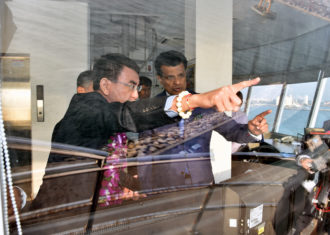
I visited the Port of Colombo, Sri Lanka in January 2018. While this is a major port handling 90% of Sri Lanka’s sea cargo, the existing terminals are saturated, and the developments of south ports are carried out in series. Many escort ships of the Japan Maritime Self-Defense Force also call at this port.
―― To promote this Strategy, cooperation with not only the United States, Japan’s ally, but also other partners such as India and Australia and ASEAN countries will also be important.
Kono: When President Trump visited Japan, we shared the view that Japan and the United States would cooperate in promoting this Strategy. I take every opportunity to explain this Strategy in detail to other countries, and I have obtained support from many countries. We can cooperate with any country which can support this idea. We will flesh out cooperation by working together with the countries concerned.
―― Some view it as a countermeasure against China’s “One Belt, One Road” initiative.
Kono: If the “Free and Open Indo-Pacific Strategy” is understood as a strategy that is to counter China’s “One Belt, One Road,” this is a complete misinterpretation. The “Free and Open Indo-Pacific Strategy” neither targets any specific country, nor is it something that is implemented as a countermeasure against any vision.
The maritime order in the Indo-Pacific region is facing various challenges such as piracy, terrorism, proliferation of WMD, natural disasters and illegal fishing. We are promoting this Strategy to make the region “international public goods” that bring stability and prosperity. This Strategy involves maintaining and strengthening a free and open maritime order across the Indo-Pacific region through addressing those challenges, as well as through enhancing connectivity within the region by developing Quality Infrastructure. I believe that we can cooperate with any country, including China.
Increasing presence in the Middle East diplomacy
―― Minister, you place emphasis on stronger involvement in the Middle East. What is the aim of this?
Kono: The Middle East is a major source of energy supply for Japan and sits on a major international maritime route. It has also become a hotbed of terrorism and violent extremism, and the stability of this region is essential for the peace and prosperity of Japan. Japan is also neutral from the standpoint of religion and sects and from an ethnic point of view, and has no history of colonization. In addition, Japan also has good relationships with every country in the Middle East and is in a position where it is able to exchange various opinions with the United States, with which we have formed a special alliance. There is great significance for Japan’s economy and security in taking a stronger role in achieving peace and prosperity in the Middle East and eventually contributing to the peace and prosperity of the world, taking advantage of such a unique position.
―― The regional political situation is chaotic. What kinds of initiatives are you thinking about?
Kono: This region has a raft of challenges, including the Middle East peace process, conflicts in Syria, Yemen and Libya, tense relations between regional major countries over Iran and Qatar and violent extremism. We will actively advance efforts that are unique to Japan under the “Kono Four Principles,” the basic policy on Middle East diplomacy that I announced when I visited Cairo in September 2017, which consist of (i) intellectual and human contribution, (ii) investment in people, (iii) enduring efforts, and (iv) enhancing political efforts.
Direct person-to-person relations matter in the Middle East. I want to make the most of the human networks I have been cultivating.
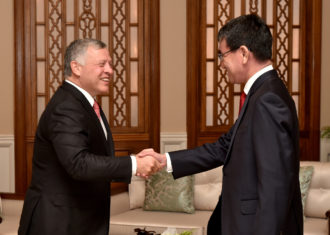
I made a reunion with King Abdullah II when I visited Jordan in September 2017.
I was a fellow student of the King at Georgetown University, and we exchanged views on situations in the Middle East and the North Korean issues at a luncheon after the audience.
―― Minister, before you were appointed as foreign minister, you developed personal connections with key persons in the Middle East, such as Saudi Arabia’s Crown Prince Mohammed bin Salman.
Kono: As far as Saudi Arabia is concerned, I visited the country several times before I became foreign minister. As recent examples, I visited Saudi Arabia in May 2015 as member of the House of Representatives and in July 2016 as Minister in charge of the National Police Organization to have talks with senior government officials. In September 2016, I met with Crown Prince Mohammed bin Salman at the State Guest House when he visited Japan (when he was Deputy Crown Prince). Because of this connection, I had the first telephone conversation as foreign minister with Crown Prince Mohammed bin Salman on August 4, 2017 and paid him a courtesy visit when I visited Saudi Arabia in September 2017.
I am also in friendly terms with King Abdullah II of Jordan, partly because of the connection that we were fellow students at Georgetown University. When I visited Jordan in September 2017, King Abdullah II held a luncheon where we renewed our old friendship and had in-depth discussions on the regional situations.
―― In relation to this, Minister, you are very positive about parliamentary exchanges with countries in the Middle East.
Kono: As I said earlier, the Middle East is a significant region that could be directly linked with the security and peace of Japan. Before inaugurated as foreign minister, I held discussions on what Japan could do to get closer to the Middle East and whether Japan could do more for the peace and prosperity of the Middle East.
The Middle East is a region where direct person-to-person relations, including those between leaders and foreign ministers, matter in obtaining their trust, compared with other regions. I think that to deepen mutual understanding, it is important for more people, including Diet members, to continue to undertake interactions in various forms. I would like to promote Kono diplomacy in the Middle East while making the most of human networks I have built in this way.
Nuclear disarmament without taking security into account is not our choice
―― On nuclear disarmament and non-proliferation, the Treaty on the Prohibition of Nuclear Weapons was adopted at the United Nations in July 2017. Japan has not signed the Treaty. Why is Japan unwilling to do so?
Kono: Japan has a mission to lead the efforts of the international community towards the elimination of nuclear weapons, as the only country that has suffered atomic bombings during war and that has a clear understanding of the humanitarian consequences of the use of nuclear weapons. At the same time, the Japanese government has a duty to protect the lives and property of people against the real threats of nuclear weapons. To tackle nuclear disarmament, we need to have both humanitarian and security perspectives.
Japan also shares the goal of elimination of nuclear weapons that the Treaty on the Prohibition of Nuclear Weapons aims to achieve. However, in its negotiation process, the Treaty was created without taking into account the actual security perspectives. Hence, it does not gained support not only from the nuclear-weapon States but also from some non-nuclear-weapon States that are exposed to the threat of nuclear weapons.
In addition, the development of nuclear weapons and ballistic missiles in North Korea has become an unprecedented, grave and imminent threat to Japan and the international community. It is difficult only with conventional arms to deter ones, such as North Korea, that is threatening to use nuclear weapons. Thus, deterrence by nuclear weapons is absolutely essential. Based upon such a severe security environment, the reality lies in that we must maintain deterrence including nuclear deterrence under the Japan-U.S. Alliance.
―― You mean that the Treaty on the Prohibition of Nuclear Weapons will impair the safety of Japan, do you not?
Kono: If we join the Treaty on the Prohibition of Nuclear Weapons, we will impair the legitimacy of nuclear deterrence by the United States. This would be equivalent to say that we don’t mind letting the lives and property of the people of Japan be exposed to danger. The government cannot make such a choice. As the government that is responsible for protecting the lives and property of the people, we think that it is necessary to explore ways of steadily and practically advancing nuclear disarmament while dealing appropriately with real security threats. Japan’s way of thinking is different from that of the Treaty on the Prohibition of Nuclear Weapons. This is why Japan cannot sign the Treaty.
―― What kinds of approach will Japan take?
Kono: Amid of the deteriorating international security environment, including the development of nuclear weapons and missiles by North Korea, differences in the approach regarding how to advance nuclear disarmament are currently emerging, not only between nuclear-weapon States and non-nuclear-weapon States but also between non-nuclear-weapon States that are exposed to nuclear threats and those that are not. Against such a backdrop, in order to practically advance nuclear disarmament, we need to seek for a common ground where various countries with different positions will be able to unite and work together while rebuilding their trust through involving both non-nuclear-weapon States and nuclear-weapon States.
I believe that it is of great significance and extremely convincing that Japan will undertake such a role, as no other country understands the devastation caused by the use of nuclear weapons than Japan who has been working to achieve a world free of nuclear weapons with all its heart and soul while facing nuclear threats and the severe security environment.
――Specifically, how do you think Japan can contribute?
Kono: The first example is the resolutions towards the total elimination of nuclear weapons that Japan has submitted to the UN General Assembly every year. As I said earlier, the international security environment is deteriorating, including the development of nuclear weapons and missiles by North Korea, and differences in the approach regarding how to advance nuclear disarmament are coming to the surface in the international community. Against such a backdrop, the resolution in 2017 aimed to involve nuclear-weapon States, to serve as a bridge among countries in different positions, and to seek a common ground where countries can work in a united manner. I feel encouraged by the adoption of this resolution with widespread support from a total of 156 countries, including nuclear-weapon States such as the United States, the United Kingdom and France, as well as 95 countries who voted for the Treaty on the Prohibition of Nuclear Weapons which has a different approach from Japan.
On November 27 and 28, we also held the first meeting of the Group of Eminent Persons for Substantive Advancement of Nuclear Disarmament in Hiroshima. At the meeting, discussions were held towards substantive advancement of nuclear disarmament while overcoming differences in position. We will receive recommendations that will contribute to the rebuilding of trust between the nuclear-weapon states and the non-nuclear-weapon states and will provide an input to the Second Preparatory Committee of the NPT Review Conference in 2018.
Towards realizing “a world free of nuclear weapons,” Japan will continue to tenaciously advance concrete and practical efforts in which the nuclear-weapon countries participate, such as the NPT, the Comprehensive Nuclear Test-Ban Treaty (CTBT) and the Fissile Material Cut-Off Treaty (FMCT), while making full use of the Non-Proliferation and Disarmament Initiative (NPDI), which is a cross-regional group of non-nuclear-weapon States that represent various positions.
Serving as a flagman for free trade
―― At the meeting in Da-nang in November 2017, the Trans-Pacific Partnership (TPP) Agreement was largely agreed by the 11 countries. What do you think of its significance?
We would like to seek for a common ground where countries with different positions can unite and work together.
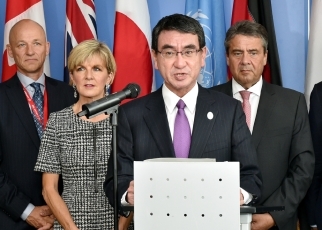
At the 9th Ministerial Meeting of NPDI held in New York in September 2017, Foreign Minister Kono delivered a statement. Australian Foreign Minister Bishop is on the immediate left of Minister Kono, and German Foreign Minister Gabriel is on his immediate right. The NPDI is a cross-regional group of non-nuclear-weapon States launched in 2010 under the initiative of Japan and Australia. The photo shows the first ministerial meeting held in three years.
Kono: In the face of the rise of protectionism around the world, Japan intends to expand the rules for free and fair trade and investments from the Asia-Pacific region to the world, and the TPP and the Japan-EU Economic Partnership Agreement (EPA), the negotiations for which were settled in December 2017, were the fruits of Japan’s long-standing leading efforts.
US President Trump announced withdrawal from the TPP in January 2017, immediately after he took office. However, Japan has led the early entry into force of the TPP, and the 11 countries have engaged in negotiations in league to achieve the TPP, which should be the foundation for the twenty-first century type of trade and investment rules by all means. As a result, we were able to reach an agreement in principle in November 2017 in Da Nang. Japan will continue negotiations for the TPP to be signed by the 11 countries and enter into force as soon as possible by promptly resolving the remaining issues.
―― In East Asia, the Regional Comprehensive Economic Partnership (RCEP) is also being negotiated in parallel.
Kono: The RCEP is a huge regional economic partnership that includes non-TPP members such as China, South Korea and India. If the RCEP comes into effect, a broad economic zone accounting for approximately half the world population and about 30% of the global GDP as well as the total global trade will appear, and a huge global supply chain will be established.
To build a framework for free and fair trade in the entire Asia-Pacific region, we will make efforts to realize as much as possible the high-quality RCEP, which consists of countries at various stages of development. To that end, Japan will continue the negotiations vigorously for a swift conclusion of a “high-quality” agreement not only in the area of market access, but also in the area of rules such as e-commerce and intellectual property.
Whatever the case may be, Japan will continue to promote other economic partnerships such as the RCEP and the Japan-China-Republic of Korea Free Trade Agreement while aiming for the early signature and entry into force of the TPP and the EPA as a flagman of free trade.
Note: final confirmation on January 19, 2018.
Translated from “2018 Nihon gaiko no tenbo: Kitachosen eno atsuryoku wo tuzukete hikakuka wo semaru (Japan’s Diplomatic Landscape in 2018: Pushing for the Denuclearization of North Korea by Continuing to Apply Pressure),” Gaiko (Diplomacy), Vol. 47, Jan./Feb. 2018, 6–19. (Courtesy of Toshi Shuppan) [January 2018]
Keywords
- Japan-US Alliance
- North Korean issues
- East China Sea
- South China Sea
- rise of protectionism
- Free and Open Indo-Pacific Strategy
- abductions issue
- Six-Party Talks
- Japan-US “2+2”
- Treaty of Peace and Friendship Between Japan and the People’s Republic of China
- Code of Conduct in the South China Sea
- AIIB
- “Belt and Road” initiative
- Treaty on the Prohibition of Nuclear Weapons
- TPP11
- Japan-EU Economic Partnership Agreement
